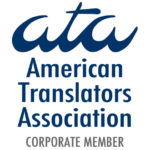What is back-translation?
The process of back-translation consists of translating a previously translated text back into the original language. Ideally, a back-translation should be performed by an independent translator who did not participate in the original translation. The back-translation may then be compared to the original text to check the accuracy of the initial translation. Even careful translators and editors make mistakes, and the back-translation process offers a second chance to catch errors, omissions, additions or misinterpretations of the text.
A back-translation will rarely yield a result identical to the original text. Above all, it’s important for the back translation to reflect the same meaning as the original document, even if the word choice or word order differs slightly. A back-translation should be very literal but still idiomatic.
When is back-translation typically used?
- Clients often request a back-translation to check the quality of the translation when the subject matter demands an extremely high degree of accuracy, for example, in clinical trials. They prove particularly useful for picking up errors that may be easily missed by the proofreader but that can have dire consequences. Some ethics committees and institutional review boards (IRBs) require back-translations before granting research approval.
- In the field of advertising, translators tend to get creative and embellish the copy, occasionally moving away from the meaning of the original text. In some instances, even slight deviations in meaning can cause serious legal problems for the agency or client. With a back-translation, the client’s legal department can detect these potential legal issues. In addition, back translations of ad copy can allow the client to get a better feel for how the advertising concept is being expressed in the target language.
- A back-translation may be requested when the reviewer doesn’t know the target language, especially in the case of unusual language combinations (i.e. Spanish to Luxembourgish).
The argument against back-translation
Some translators consider back-translation to be a fruitless exercise. Rather than perform a back-translation, there are those who argue for the original translation to be reviewed by an experienced, qualified proofreader as well as an expert with technical background (e.g. a doctor or other medical professional in the case of a medical translation, a lawyer for a legal translation).



